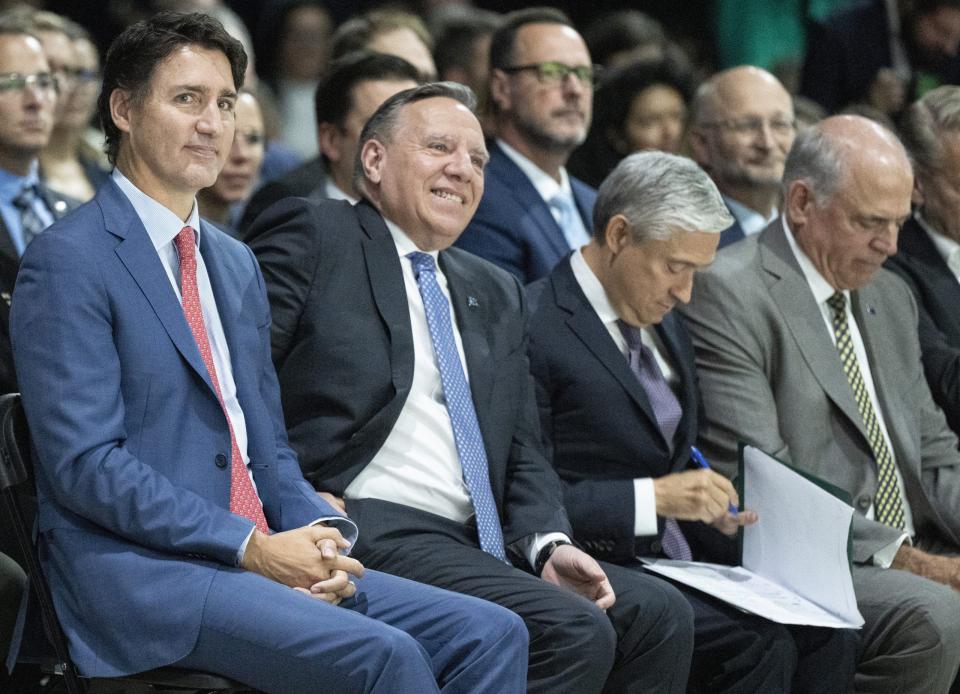William Watson: A new Dark Age of industrial policy descends

The Economist is running an epically and epochally gloomy lead editorial this week: “Are free markets history?” — with a cover that depicts cargo containers, symbol of post-war globalization, stacked in the manner of Stonehenge megaliths. Will visitors to a future Box-henge puzzle over what these empty steel structures were and why they meant so much to people who lived between 1950 and 2025?
The editorial reminds us the Economist itself was founded in 1843 to support the liberal principles of free trade and a modest role for government. Though application of these principles over the ensuing 150 years has made much of the world rich, well beyond even the considerable ambitions of Victorian Englishmen, almost no Western political party these days defends them.
Instead, “industrial policy” is the intellectual fashion, both on the Left, where it has always been in vogue, but now also on the Right, where notions of restrained government (a phrase almost oxymoronic and certainly comical), competition, open markets and private-sector primacy are now regarded as quaint — last decade’s if not last century’s ideas. Nothing is more damning in our attention-deficient 21st-century world than to be old.
True, the word “planning,” so popular in the 1930s, is not heard much these days. But in this country, one government department after another is enacting its “vision” of how the future should unfold. Food and shelter, two of life’s three essentials, are now receiving Ottawa’s attentive ministrations. Clothing so far is omitted from the plan, though nationalist voices are heard (“Why isn’t more clothing made in Canada?”) and our governments do provide funds for Canadian fashion, albeit not the tens of billions available for batteries. The federal government also has detailed plans for newspapers, the internet, energy, rare earths, reviving Canadian manufacturing and exporting, oil and natural gas, carbon capture, shipbuilding and so on. You name it — or propose and lobby for it — and we support it. And of course government’s role continues to be central in defence, health care and education — three truly crucial sectors where underperformance is chronic.
What has changed to make people think industrial policy should take over from markets? Yes, there were shortages of masks, gowns and ventilators in the first six months of the pandemic — though not of vaccines after the first 12. And, yes, China has become increasingly unfriendly. Does either development really warrant chucking our own very successful economic system and going over to a Chinese style of economic activity, which is actually a Xi Jinping style, in which government leads and industry meekly follows?
And what has changed in the world or in people’s characters to make us think we are now capable of the economic planning that has proved so difficult everywhere it has been tried?
Is the future more foreseeable now than in earlier eras? Many of us remember 2007, when Steve Jobs announced the birth of the iPhone. Fewer of us, but still enough, were around in the early 1990s, when the internet began to catch on. Raise your hand, please, anyone who then predicted, with even 50 per cent accuracy, how we would live now, or the economy evolve, or even who the big players would be (Nortel, Nokia, Blackberry, Netscape?).
Are we more prescient now? Even Massad, it seems, is having trouble figuring out the future these days. One can only wonder at the confident clairvoyance of François-Philippe Champagne and Steven Guilbeault as they tell us what life will be like in 2030 and even 2050.
Is the economy less complex than it was? Is change slower, so we have more time to figure out what’s going on? Technological turnover may actually have been more revolutionary in 1800-50 or 1900-50 than 1973-2023. But most of us find today’s pace quite bewildering enough, thank you.
Finally, are we better people now, more selfless, less petty, less inclined to graft and grift or to abuse powers that fall into our hands? Reading the biography on which the movie Oppenheimer was based, it’s impossible not to be struck by how hard thousands of people worked between 1942 and 1945 and how much they gave of themselves because they believed in the cause for which they were sacrificing. But that seems a world away from the Ottawa (or Queen’s Park or Quebec City) we all know today, driven as they are by lobbyists, consultants and communications specialists. Maybe our billion-dollar battery ventures, all three of them, will turn out to be the Manhattan Projects and Apollo Programs of our times. Forgive me for skepticism. It seems more than clear that what makes industrial policy so attractive to so many is that they covet the powers it would give them.
Let’s ditch 'racialized' and go back to terms Canadians prefer
The left likes competition policy, just not actual competition
There is a disturbingly elegiac tone to the Economist’s editorial. The new dark age of industrial policy is descending, it seems to say, and nothing can be done about that. But it will all go very badly and eventually the world will return to liberalism. The prospect of that happy ending somewhere down the road is not altogether comforting.
Churchill said democracy is the worst form of government, except for all the others that have been tried. He might have added: free markets are the worst form of organizing an economy, except for all the others that have been tried. Must we really spend the next couple of decades and a big slice of our standard of living re-learning that lesson?

 Yahoo Finance
Yahoo Finance 